Will the Indo-Afghan strategic agreement project India's soft power and provide it strategic depth or is it a high-risk gamble that will come to haunt us in the future? Sheela Bhatt finds out
"It is not worth it if you don't have any strategic agreement in country where you are spending $2 billion (about Rs 9,800 crore)," said a senior officer in government dealing with Afghanistan and Pakistan when asked about which factors necessitated the Indo-Afghan Strategic Partnership agreement. He said, "Look around India. Has India invested so much and so well in any other country? In which other country is India is spending so much money?"
Prime Minister Manmohan Singh and President Hamid Karzai signed an agreement that was in making since the last one year on October 4, says the officer in the Prime Minister's Office.
Dr Singh himself had said on eve of signing the agreement, "based on intensive consultations and deliberations, we have finalised an agreement on a strategic partnership."
The Indian officer added, "It was not done in hurry. We were working on it. There was nothing secret about it because what we wanted to say we said it in the May, 2011 joint declaration in Kabul." He insisted that the strategic partnership agreement is just collection of all that India and Afghanistan are doing together.
It was argued that the agreement was necessary from the Afghan side because the vulnerable nation is in process of taking over some of the duties of the North Atlantic Treaty Organisation forces after they leave the country in 2014. Karzai needs to train his security officials. Obviously, it's not easy to go for such a legitimate but controversial agreement because of India and Pakistan's rivalry and the high stakes of many nations in and around Afghanistan.
...
'India supporting Karzai when he is getting weaker'
Image: Karzai at a news conference in New DelhiPhotographs: Reuters
The agreement has attracted widespread commentaries. People sympathetic to India are seeing it as India's attempt to help the ravaged nation by training their security forces. It is seen as India's attempt to stake a claim in the future of the region if and when NATO forces leave Afghanistan. It is beyond doubt that India is, primarily, motivated by its genuine security concerns.
India is also giving Karzai some support when he is getting weaker and weaker. Also, the strategic agreement is a natural progression for India, who has pumped whopping $2 billion in the region without any substantial strategic gain, so far. Within India, few analysts were arguing since long that India is not doing enough to consolidate its soft power in Afghanistan.
The officer gave the argument that, "Some people said India is doing nothing in Afghanistan. Also, there is a school of thought in India who said India should pack up from Kabul and return. We can't give away space to Pakistan, since terrorism will grow. We shall not allow that to happen."
The agreement is also seen as India's gamble in the region where the 'anti-India' Taliban controls a substantial area. If the aims of strategic partnership fails, India will continue remaining under threat of insecurity as it is today, thinks the Indian establishment.
'Afghan agreement is India's proxy war against Pak'
Image: Dr Singh and Karzai exchanging the singed documents of an agreement on Strategic PartnershipPhotographs: Reuters
The critics of this agreement see India trying to get strategic depth to counter Pakistan's attempt to have strategic depth since the last many decades. They see the move as containment of the Taliban and Pakistan with the help of Western countries. Some have hinted that this agreement, if implemented, would make India more vulnerable to terrorism.
Many editorials in Pakistan are saying it is India's proxy war against Pakistan from its western border.
The experts are divided if America is happy or unhappy with the agreement. The US spokesman's initial response was muted. The Indian officer says, "Even India's response would be muted if US signs such an agreement with Afghanistan."
Karzai in his speech during the India visit hinted that the strategic agreement with India has pan-Afghan support but any such agreement with America will have to be taken to Loya Jirga (grand council of Afghan elders). The Indian officer pointed out that America should not be unhappy because it paves the way for other countries including America to have such agreements with Afghanistan. He insisted that, "Ours is a harmless agreement."
'India's decision to guarantee Afghan govt doesn't wholly lack logic'
Image: Foreign Minister SM Krishna speaks with Afghanistan's President Hamid Karzai during their meeting in New DelhiPhotographs: Reuters
While analysing (external link) the logic behind the controversial agreement The Guardian columnist Simon Tisdall has said that, 'India's decision to underwrite and, in effect, guarantee Hamid Karzai's feeble Afghan government is not wholly lacking in logic."
He thinks, "With US and NATO forces edging towards the exit in 2014, it follows that Delhi, the region's military and economic heavyweight and an aspiring superpower, should take up the strategic slack. But that is not how Pakistan or the Taliban will see the newly announced bilateral security, political and commercial "partnership". India may yet pay heavily for its presumption,' he adds.
However, strong adverse reactions from Western commentators and Pakistani experts has not deterred the Indian side. Informed sources claim that when Dr Singh went to Kabul in May, everything was ready to embark upon a 'strategic partnership'.
When the agreement was conceived, Karzai was reluctant, initially.
But, as more details of American and Pakistan's links with the Taliban came out, the agreement made sense, claims the Indian side. The assassination of former Afghan president Burhanuddin Rabbani prompted Karzai to arrive at a decision to go in for an agreement. However, sources are denying firmly that it has anything to do with Rabbani's assassination.
"You should read carefully the May 12 joint declaration when Dr Singh visited Kabul. Not a word is added to it in October. Then, the strategic partnership was formed, but, wasn't signed," says the Indian diplomat involved in the process.
'India venturing into Afghanistan at high risk'
Image: Dr Singh shakes hands with Afghan officials as President Hamid Karzai looks on at the presidential palace in Kabul on May 12Photographs: Reuters
The Indian side insists that Karzai and Singh are giving importance to the Treaty of Friendship between the government of India and the royal government of Afghanistan of January 4, 1950.
Moreover, a senior officer pointed out that right in May both countries had talked about, "their commitment to the purposes and principles of the United Nations Charter."
On basis of it, "India and Afghanistan decided to establish a strategic partnership covering all areas of mutual interest. Based on mutual understanding and long term trust in each other, this partnership envisages the elevation of their multifaceted ties to a higher level, both in the bilateral field and in the international arena."
In fact, many experts like Tisdall think that India is venturing into Afghanistan at high risk. He wrote, "India's leaders one day may come to rue their vainglorious generosity in picking up the hot potato that the US, Britain and the rest all gingerly dropped. It seems a high price to pay for outflanking Pakistan."
Some Indian critics are saying that by signing the agreement with Karzai, India is alienating the Pashtuns who are averse to his leadership. Dilip Hiro, distinguished writer on international affairs, in his article Slippery Road Ahead (external link), said that, "For India to see the Taliban precluded from power-sharing in the post-NATO Afghanistan is tantamount to excluding Hindi speakers from the government in New Delhi. The Pashtuns, forming 42 to 46 per cent of Afghanistan's population, support the Taliban by a wide margin. The 13 Pashtun-majority provinces, out of 34, account for 55 percent of the country's 30 million people."
'With or without agreement, Taliban not going to change their view of India'
Image: A Taliban cadre gets ready to shootIn response, an Indian officer told rediff.com, "These critics are not well-informed. They seem to be considering all the Pashtuns as the Taliban. The Taliban is significant force. But not all Pashtuns are Taliban." After a pause, he added, "As it is the Taliban is not going to change their view of India with or without this agreement."
The senior officer, while continuing to talk off the record, further said, "People like Hiro who are talking about India's relations with Pashtuns do not know the changing ground realities. Do they know what's happening on the ground? In the last couple of years India's new aid is going only to Pashtun-dominated areas in Afghanistan. All our SDPs (small development programmes) are running in Pashtun majority areas. In fact, people from the northern area are complaining. Our import of fruits and dry fruits under the South Asian Free Trade Agreement is growing."
In fact, Kandahar, city dominated by Pashtuns, exports more than $50 million (about Rs 245 crore) worth of fruits and dry fruits every year of which India is the largest importer. The growers and the truck owners who transport the products are mainly Pashtun.
These Pashtuns truck-owners of Afghanistan and Pakistan's North-West Frontier Province have developed the vested interest in the business, says the officer. He says, "Fruits and dry fruits from Kandahar comes through Wagah border even today. They gain through the peaceful relationship amongst the three countries. India is the fifth largest trading partner of Afghanistan."
But, the issue is not limited to the Pashtun perception of India, it is about Pakistan's insecurity about India, also. If Pakistan feels alienated or targeted it will not give strength to such strategic partnership, argue critics. Within Pakistan there is lots of heartburn.
'Pakistan hated by most Afghans, India seen as a benefactor'
Image: Afghan men shout anti-Pakistan slogans during a demonstration in KabulPhotographs: Reuters
Khaled Ahmed wrote (external link) in the Friday Times that, 'With minds inflamed by purely military thinking, Pakistanis tend to be convinced that India has been finally given the go-ahead by America to establish itself firmly in Afghanistan. And if it trains the Afghan military personnel in Afghanistan, it might result in the posting of Indian troops there; and this will challenge the Pakistan Army directly under the doctrine of 'strategic depth'. If this kind of thinking is advanced further, Pakistan will be obliged to bite off far more than it can chew in the coming months.'
The Daily Times editorial (external link) was more realistic and pointed out Pakistan's error in its strategic thinking that led 'Afghanistan into India's arms.'
It said, 'The 'nutcracker' squeeze from east and west so feared by our military strategists may well now become a reality, especially given the recent frictions between Kabul and Islamabad over the safe havens in Pakistani soil used by the Afghan Taliban and the Haqqani network to attack US/NATO/Afghan forces across the border and the assassination of Burhanuddin Rabbani."
While explaining the reason behind the India-Afghanistan strategic partnership it said after 9/11 and the invasion and occupation of Afghanistan, whereas India projected soft power into Afghanistan, 'Pakistan stuck to its old paradigm of offering safe havens to and supporting a proxy war by the Taliban and the Haqqani network.'
It said Pakistan missed a golden opportunity. 'Now, Pakistan is hated by most Afghans whereas India is seen as a benefactor and true friend.'
'India-Afghan agreement on paper; long way to go'
Image: Dr Singh with KarzaiHowever, within the Indian establishment there is no hype. An intelligence officer in a security establishment dealing with Pakistan-Afghanistan said, "The strategic agreement is on paper. There is a long way to go. The entire event will become significant if only Karzai requests, I repeat, if only he sends a request to India to train its soldiers or requests us to equip their regiments. That demand is unlikely to come. Karzai knows he can't push Pakistan beyond a point. We are training some of their senior army officers in India but that's not unknown."
He, repeatedly, emphasised that, "The strategic agreement will be implemented by mutual consultation only."
A diplomat, who was part of the team that dealt with Karzai's team, said, "We have strategic agreements with many other countries. So this agreement is one more addition."
But, when counter-argued that in case of India's relations with Afghanistan, Pakistan is the elephant in the room, the diplomat responded, "Let it remain in the room. Do you succumb to it? We have a function to perform in Afghanistan. We are fulfilling our role."

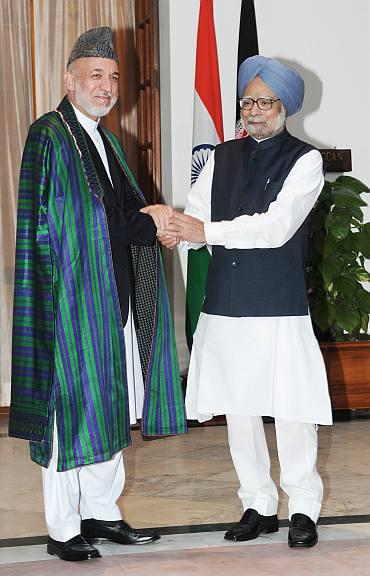
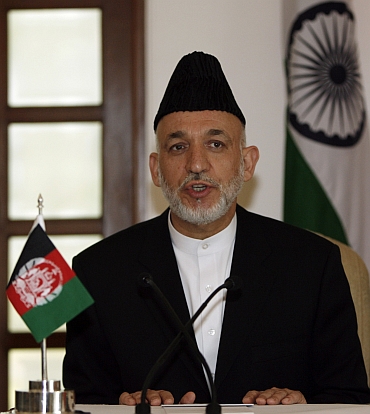
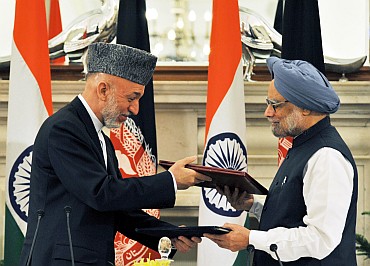

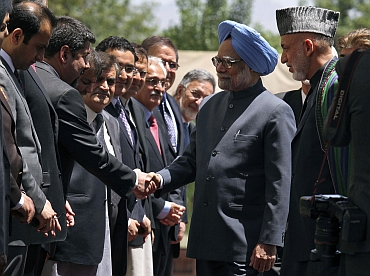
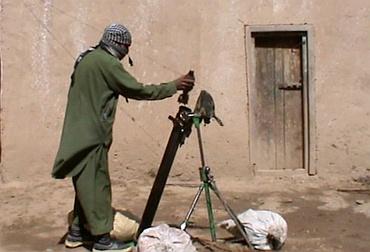

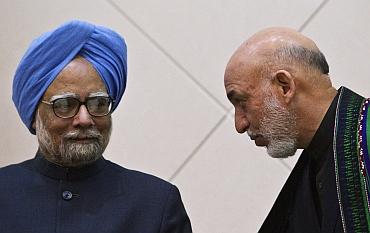
article